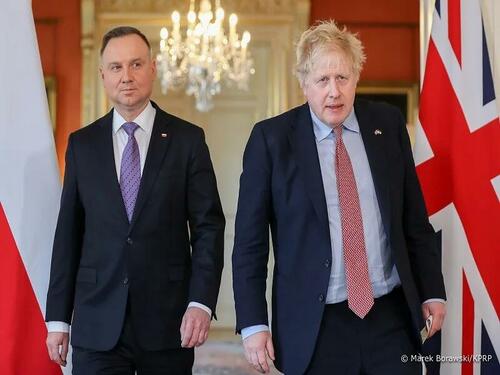Authored by Andrew Korybko via Substack,
The New York Times published the full version of the spring 2022 draft peace treaty between Russia and Ukraine over the weekend, which confirmed a lot of what was previously reported but also included some interesting details from unnamed diplomatic sources about why these talks ultimately failed. According to a European one who was present at the Extraordinary Summit of NATO Heads of State and Government on 24 March 2022, Polish President Andrzej Duda dramatically railed against this deal:
“Leaders in Poland — early and strong supporters of Ukraine — feared that Germany or France might try to persuade the Ukrainians to accept Russia’s terms, according to a European diplomat, and wanted to prevent that from happening.
To that end, when Poland’s president, Andrzej Duda, met with NATO leaders in Brussels on March 24, he held up the March 17 text, said the diplomat, who was present. ‘Which of you would sign it?’ Mr. Duda asked his counterparts, the diplomat said. None of the NATO leaders spoke up.”
It was already observed on 29 March 2022 that “Poland’s Ruling Party Helped Provoke The Worst Security Crisis Since WWII”, albeit for different reasons than what was just revealed, namely the way in which their self-interested anti-Russian fearmongering helped reshape the US’ deep state dynamics. Now there’s no question that Poland was actively trying to sabotage the Russian-Ukrainian peace talks and that its efforts predated former British Prime Minister Boris Johnson’s infamous trip to Kiev.
President Putin confirmed in his interview with Tucker Carlson earlier this year what Zelensky’s top ally David Arakhamia disclosed in late November about how that leader convinced Ukraine to keep fighting. In his words, “the fact that they obeyed the demand or persuasion of Mr. Johnson, the former Prime Minister of Great Britain, seems ridiculous and very sad to me.”
It’s now known, however, that there was more leading up to this than even the Russian leader himself thought as recently as four months ago.
Duda’s dramatic display at March 2022’s NATO meeting did more for unifying the West around the cause of perpetuating their proxy war on Russia through Ukraine than anything else that’s thus far been reported. This in turn greatly facilitated Johnson’s subsequent trip to Kiev over two weeks later where he was then able to convince his hosts that the West has their back if they keep fighting. His country and Poland also had an ace up their sleeves to play just in case France and Germany pushed for peace.
They and Ukraine forged an informal alliance on 17 February 2022 in the literal week before the start of Russia’s special operation, which evaded most observers’ attention due to the fast-moving events that preceded the latest phase of this decade-long conflict. So long as Poland was in favor of continuing hostilities, which nobody had any doubt about but hadn’t earlier known just how zealous it was, then the UK could rely on it as a land bridge for the emergency dispatch of military equipment to Ukraine.
The whole point in agreeing to form this pact was to give Ukraine the ability to keep fighting if it chose to in the event that conventional hostilities broke out with Russia like they did a week later. Ukraine knew that the UK’s commitment was rock-solid due to its centuries-long policy of dividing-and-ruling Europe, while Duda hyperbolically reaffirmed Poland’s two weeks before Johnson’s visit to Kiev, which wasn’t previously reported but would have obviously been passed along to Ukraine at the time.
The Polish leader’s dramatic display set the stage for his meeting with Johnson right before the latter’s trip to Kiev, therefore convincing Zelensky that he does indeed have a credible means to perpetuate the conflict with the view of ending it on better terms. Had it not been for Duda making a big show out of his country’s opposition to the draft peace treaty and pledging his support for Ukraine with Johnson, then Zelensky might have doubted Poland’s commitment to their alliance, thus saving the peace process.
The newfound insight that Poland was just as much to blame as Britain for sabotaging spring 2022’s peace talks vindicates Confederation party chairman and newly elected MEP Grzegorz Braun for what he said in an interview over the weekend. He shared his concerns from 6:00-8:23 about Poland once again being exploited by the Anglo-American Axis to usher in another new world order that would follow his country sparking World War III in the coming future just like the role that it played for them in 1939.
The risk of World War III breaking out is now higher than it’s ever been since the Cuban Missile Crisis due to the US’ dangerous game of nuclear chicken with Russia, and the only reason why everything got to this point in the first place is because Poland helped sabotage spring 2022’s peace talks. Had it never agreed to that February’s informal alliance with the UK and Ukraine or if Duda would have reconsidered his country’s commitment to it, then there likely wouldn’t be any such serious risk at present.
As Braun said later on in his interview, there’s now a very real chance that Polish meat could be thrown into the Russian grinder to follow the half-million Ukrainian troops who were already killed in this conflict, the scenario of which readers can learn more about here and here. If Poland conventionally intervenes in Ukraine, then the risks of World War III breaking out would instantly spike, which could turn his warning about its historical role in global affairs into a prophecy.
Source link


